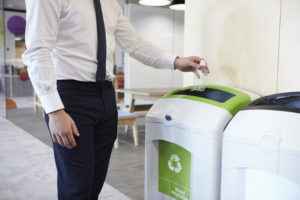Recycling is both socially and fiscally responsible, as you surely know. Adding less waste to our landfills and using less of our limited natural resources – what’s not to like? Just about everyone at your workplace likely agrees. But if yours is like most companies, your current recycling processes probably leave a lot of room for improvement. Creating a recycling-friendly workplace doesn’t actually require that much effort for the average employer. Making this shift is all about putting the right systems in place and letting them work.
Make Recycling Unavoidable
 Adopting a new habit is hard. Research about New Year’s resolutions shows us that. You might know that going to the gym more would help you be healthier, but it takes a lot of discipline to get up and go put on your sneakers when you’d rather stay on the couch. But if you keep your sneakers in the car and modify your route home from work so that you drive by the gym each day, suddenly this new habit seems easier to keep going.
Adopting a new habit is hard. Research about New Year’s resolutions shows us that. You might know that going to the gym more would help you be healthier, but it takes a lot of discipline to get up and go put on your sneakers when you’d rather stay on the couch. But if you keep your sneakers in the car and modify your route home from work so that you drive by the gym each day, suddenly this new habit seems easier to keep going.
The employees at your workplace probably want to recycle. The majority of them probably know the benefits and are motivated to do their part. But if it’s at all inconvenient to recycle, many of those employees just… won’t. The person who has always tossed his newspaper in the trash will keep doing that if the closest paper recycling bin is on the other side of the building.
Perhaps the single most important step you can take toward becoming a recycling-friendly workplace is to set up the space so that employees can’t help but recycle. That might mean adding more recycling containers throughout the building and/or moving containers from out-of-the-way places so they’re easily accessible. If necessary, take recycling from a “should do” to a “must do” by making official company policy around it. When recycling is part of the job requirements, employees will participate.
Recycle More Than Paper
Eco-friendly workplaces recycle more than just documents. Depending on your local laws and the type of waste your workplace generates, you may be able to recycle multiple types of metal and plastic. The metal components of some electronics can also be recycled. Depending on where your workplace is located, e-waste laws might even require that you dispose of electronics responsibly – e.g., by recycling – instead of throwing them away. (For data security purposes, any electronics that can store data need to be disassembled first and the hard drives destroyed.)
Consider whether your organization could recycle any organic waste, too. Here in Massachusetts, businesses that generate more than 1 ton of organic waste per week must recycle, compost or reuse it, but smaller businesses may choose to dispose of organic waste responsibly too. Even a company that only generates organic waste from the employee break room can establish organic waste recycling practices.
Empower Employees to Help
It doesn’t matter how invested the company leadership is in having a recycling-friendly workplace if employees don’t buy in. In some workplaces, it makes sense for one or two employees to take the lead on recycling efforts. This is a subject that a lot of people feel passionately about. If someone wants to volunteer to be the recycling coordinator and has the time to take that on, it’s worth trying – one impassioned employee can do a lot to get his or her coworkers on board.
One thing to focus on is employee education around recycling. No matter how many labeled bins you put in the office kitchen, some people will still throw recyclable cans in the trash bins and throw trash in the recycling bins. There’s a lot of confusion around what can and can’t be recycled, and what condition recyclables need to be in. Research current and specific guidelines for your area and create some sort of training around the information, whether it’s a quick refresher at a company-wide meeting or an illustrated memo distributed to all staff.
Finally, make sure your company walks the walk by committing to buy recycled products and taking other steps toward sustainability. Employees will take note if you tell them to recycle but don’t take real action on a corporate level.
Partner with Community Organizations
How can your business support recycling and sustainability efforts in its community? Partnering with local organizations can help you boost your company’s reputation for being eco-friendly, and do some good in your community at the same time.
For example, organize a company-wide day of service with a recycling/sustainability focus: employees can spend a work day cleaning up litter, planting trees or organizing their own individual environmental efforts. Your business might also decide to sponsor litter cleanup efforts along area roadways, make a donation to a community group that does local recycling education or donate composting containers to community gardens. Employees might know of local groups that need financial support for eco-friendly community projects, too.
We know that changing how your company approaches recycling might seem like more effort than it’s worth. Start small, by assessing your current needs and processes. That’s what the team at Miller Recycling is here for. We’ll help you figure out what’s working, what’s not working and what you could be doing to bring in more money for your company’s recyclables. Contact us for more information.

